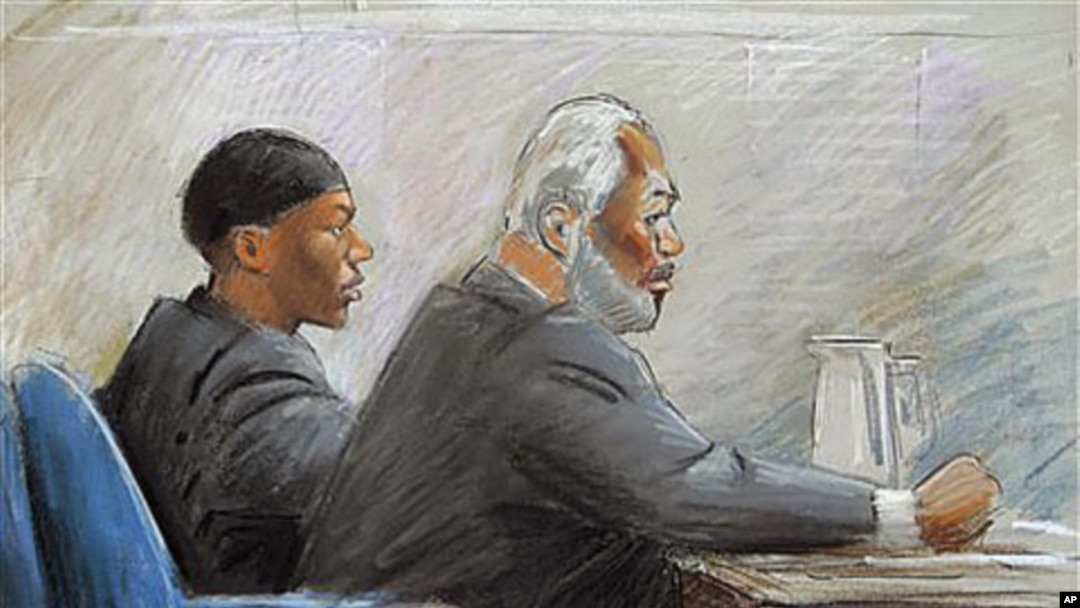The trial of Umar Farouk Abdulmutallab, a young Nigerian man better known as the Christmas Day Underwear Bomber, began Tuesday in the U.S. District Court in Detroit. The prosecution delivered its opening remarks, detailing the drama that unfolded on board the December 25, 2009 flight from Amsterdam to Detroit, and Abdulmutallab's intent to bring the plane down on U.S. soil.
In his opening statement, Assistant U.S. Attorney Jonathan Tukel told jurors Umar Farouk Abdulmutallab was on a mission for al-Qaida and that he wanted to kill all of the nearly 300 passengers on Northwest Airlines Flight 253.
Tukel gave details of how Abdulmutallab prepared himself in the plane's bathroom for the would-be suicide attack, carrying out a ritual washing and putting on perfume.
When he returned to his seat and tried to ignite the explosive device that was hidden in his underwear, Tukel says it failed to go off and instead caught fire.
Passenger Mike Zantow, the only witness to testify Tuesday, told jurors he heard a loud "pop" sound after the defendant returned to his seat from the bathroom.
The prosecutor says the bomb was made of chemicals and contained no metal parts, which enabled Abdulmutallab to slip past metal detectors and get on the plane. The defendant was seriously burned on his thighs and genital area, Tukel says.
Several witnesses were named during Tukel’s opening remarks who saw the incident that lasted only minutes, and helped put out the fire that occurred in-flight.
Tukel says the pilots were told there was a fire on board and air traffic controllers authorized a quick descent to get the plane to the ground.
Attorney Edward McMahon, who represented al-Qaida operative Zacarias Moussaoui and other defendants in terrorist cases says the government has a very straightforward case.
“They have got witnesses that have him on the plane, they have witnesses from the plane that say the bomb was going off, apparently he confessed to it as well and obviously they have the physical evidence," said McMahon.Yes, I' So, the government is going to have to make a special effort to lose the case and he is going to get life in prison.”
Prosecutor Tukel says the defendant told FBI agents about how he traveled to Yemen to try to get involved in violent jihad. In Yemen, he sought out al-Qaida and was later introduced to a Saudi Arabian bomb maker.
The prosecution says Abdulmutallab's fluency in English, possession of a U.S. visa and the fact that he was a frequent traveler to America made him an ideal candidate for the attack.
The defense declined to make an opening statement, but reserved the right to make one later. Abdulmutallab has fired his attorneys and chosen to represent himself. But he has agreed to let defense attorney Anthony Chambers deliver opening statements on his behalf.
McMahon says Abdulmutallab's decision to represent himself shows how desperate his situation is.
"It's usually a pretty hopeless case [when a defendant rejects defense representation] like this one and somebody that really wants to just make some kind of a statement as to why they did what they did or how it happened," he said. "Because it's not an effective strategy in the long term."
The defendant has made numerous outbursts in the run-up to Tuesday's opening statements.
Last week, just before jury selection began on Friday, he called the United States a "cancer." He also said he believes al-Qaida cleric Anwar al-Awlaki is still alive. Al-Awlaki was recently killed in a U.S. drone attack in Yemen.
Following the failed attack, the United States stepped up already stringent security measures at airports.
The incident also led to more intense scrutiny by U.S. anti-terrorism officials on al-Qaida in the Arabian Peninsula, which is based in Yemen. U.S. officials consider the group a lethal threat that is comparable, if not more menacing, than al-Qaida's core network in Pakistan and Afghanistan.
Prosecutor: Nigerian Man Sought Martyrdom in Botched Airline Attack

In this courtroom drawing, Umar Farouk Abdulmutallab (L) appears in federal court with Anthony Chambers, a lawyer who is assisting him in his defense, in Detroit, October 4, 2011.

